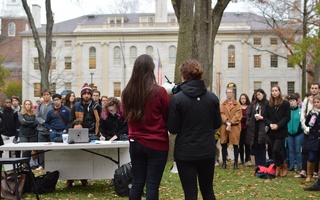{shortcode-289c18d7c026f9bdec77a6b7d2306c46babd8e28}Harvard has seen a 20 percent increase in sexual harassment complaints filed with its Office of Dispute Resolution in the wake of the scandal implicating Hollywood titan Harvey Weinstein, according to University Title IX administrators.
A wave of allegations of sexual harassment in recent weeks has brought down a slew of powerful men, prompting a reckoning in newsrooms, boardrooms, movie studios, and the halls of Congress about workplace behavior. Women across the country have launched a social media movement encouraging those who have experienced sexual harassment to share their stories publicly with the hashtag #metoo.
Administrators say the cultural moment is making a mark at Harvard. University Title IX Officer Nicole Merhill and Office of Dispute Resolution Director Bill D. McCants said they have seen an influx in reports of sexual harassment, both via formal complaints and informal disclosures called “notice incidents,” as individuals continue to come forward with their personal experiences with sexual misconduct.
“Speaking for the Title IX Office, we have certainly seen an uptick in the number of notice incidents, both at the local level for our Title IX coordinators, and notice incidents directly to the University Title IX Office,” Merhill said.
McCants said that he believes the increase is tied to the nationwide conversation.
“ODR has seen, compared to this point last year, a 20 percent increase in complaints if you compare the two periods side-by-side. And we have reason to believe that it is in part because of the #metoo movement based on statements people make—it’s very much on people’s minds,” he said.
In a letter to Harvard affiliates sharing an annual report by ODR and the Title IX Office on sexual assault prevention and response, University President Drew G. Faust condemned sexual harassment and referenced the fallout from the Harvey Weinstein scandal.
“The powerful forces of presumption and hierarchy shape our lives and our communities in profound ways,” she wrote. “Over the past few months, this reality has been underscored by revelation after revelation of sexual misconduct by individuals across the country, and we have witnessed an unprecedented movement on social media and elsewhere to share experiences, seek support, and pursue justice.”
The report notes a general increase in sexual harassment notices and complaints in recent years. Formal complaints to ODR rose 65 percent from the 2015-2016 academic year to the 2016-2017 academic year, and informal disclosures to Title IX coordinators at the College rose 14 percent in that period.
“Increases in disclosures and complaints are indications that members of our community are seeking the assistance they need,” Faust wrote in her email. “If recent events in the wider world have taught us anything, it is that marginalization and silence perpetuate the status quo.”
Harvard has redoubled its efforts to address sexual assault since a 2015 climate survey found that 31 percent of senior undergraduate women had experienced “nonconsensual sexual contact” during their time at Harvard.
—Staff writer Claire E. Parker can be reached at claire.parker@thecrimson.com. Follow her on Twitter @ClaireParkerDC.
Read more in News
Senior (Un)common RoomRecommended Articles
-
 New Title IX FAQs Expand On Previous Guidance
New Title IX FAQs Expand On Previous Guidance -
 Title IX Officer Mia Karvonides to Leave Harvard
Title IX Officer Mia Karvonides to Leave Harvard -
 DeVos Title IX Review Sparks Concern From Activists
DeVos Title IX Review Sparks Concern From Activists -
If Betsy DeVos Won’t Do It, Harvard MustHarvard must combat the narrative of DeVos’s decision—automatically doubting survivors’ allegations of sexual assault—and, instead, fully attend to students involved in sexual harassment cases.
-
 Forty Years in the Making: Dominguez and Sexual Misconduct At Harvard
Forty Years in the Making: Dominguez and Sexual Misconduct At Harvard













